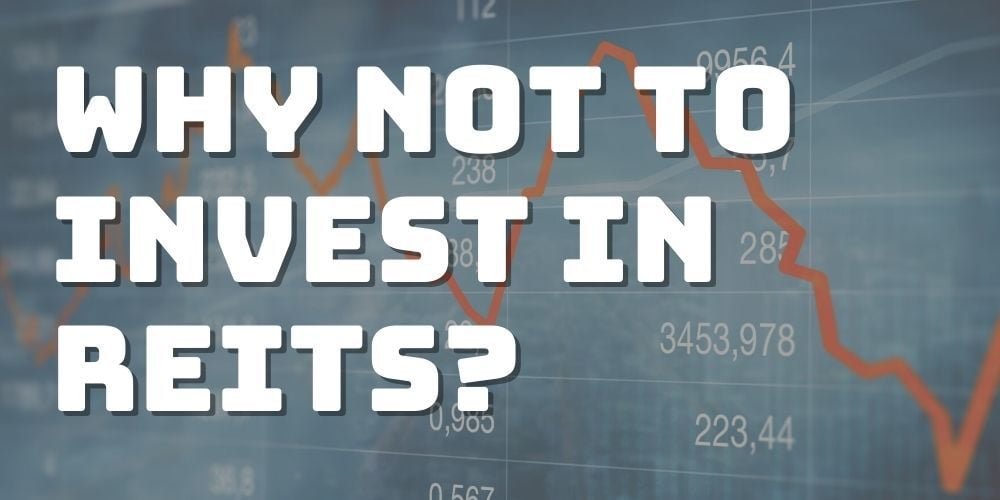REITs offer a good hedge against inflation and an excellent means to diversify an equity-based portfolio.
Considering that their returns are nearly as good as the stock market, is there any reason not to invest in them?
Here I will cover why not to invest in REITs, by exposing the good, bad, and ugly sides of this instrument.
About REITs
A real estate investment trust is a corporation that buys, operates, or finances income-producing real estate.
These trusts operate in several sectors.
Some common ones are commercial spaces, malls, housing societies, hospitality, healthcare, telecommunications, etc.
Most buy land and lease out the space to make their earnings.
Mortgage REITs are slightly different, however.
They only do financing – they create loans or buy mortgage-backed securities to fund buyers and sellers.
REITs are usually considered well-suited for a diversified portfolio.

They are known to do better when inflation rises than stocks or other investments.
Moreover, these trusts offer a regular dividend income, which makes them attractive to many investors.
So does that mean that they are a must-have for everyone?
Well, not necessarily.
There are a few concerns with REITs.
Their high correlation to interest rates and other economic indicators is troubling.
Additionally, non-traded REITs tend to be far riskier than their publicly traded counterparts.
We cover below the pros and cons of these securities and in what situations they are good for traders.
Pros
The most important reason why real estate investment trusts are sought out is portfolio diversification.
Their underlying asset is disconnected from shares.
This makes them an excellent hedge against a stock market fall.
Another key benefit that they offer is a steady, passive income.
REITs distribute more than 90% of their taxable income as shareholder dividends.
Moreover, they can legally “pass-through” these earnings without paying taxes.

This makes the total amount paid out even higher.
While they are not nearly as good at capital appreciation as stocks, they aren’t completely devoid of it either.
When the underlying real estate investments grow in value, so does the price of the REIT.
Moreover, these trusts allow investors to get into commercial real estate.
Without them, this is possible only for large corporations and those extremely wealthy.
It is nearly impossible for a retail investor.
Lastly, buying and selling a house or property requires significant work and time for those who love owning real assets.
REIT investments, on the other hand, are very liquid assets.
They give traders a piece of the pie without getting their money stuck for a long period.
Cons
The risks inherent to private or non-traded REITs are much higher than those of publicly traded ones.
We have explained these two separately below.

Publicly Traded REITs
One key issue with equity REITs is that they are highly susceptible to interest rate movements.
We will cover this in detail later, but perhaps just a sentence here.
In many cases, when interest rates rise, it can be bad for these securities.
Secondly, not all real estate trusts are the same. Most are sector-specific.
Their fortunes move along with that of the industry they specialize in.
For example, a REIT in hospitality during the Covid-19 pandemic would have struggled.
Since there were travel restrictions and hotels were closed, such properties would have yielded very poor results.
Lastly, the dividends from these trusts are taxable at the ordinary income tax rate.
The IRS can extract a fair bit from the earnings if you are in a higher tax slab.
This is potentially a turn-off for investors wanting to create a steady income from them.
Non-Traded REITs
One major issue with non-traded REITs is that they are not subject to disclosure norms.
A prospective buyer has no way to research them properly.
Therefore, it isn’t easy to establish what their right price might look like, leaving aside their own claims.
Private REITs know this well.
Some might overhype their potential or misrepresent facts to jack up prices.
Since they are not traded on stock exchanges, liquidity is sorely lacking.
There is no easy way to dispose of them if these securities are not doing well.
Many even have norms regarding how many years they need to be held before investors can sell them.
A few allow early exits but have penalties involved.
Some non-traded REITs also indulge in malpractices. They use shareholder investments to pay out dividends.
This is similar to an MLM scheme where money from new joiners is used to pay off the older ones.
It limits the cash flow available for reinvestment, and this entire process undermines the value of the security.
Another problem is their high upfront fees.
Many privately held or non-traded REITs charge as high as 9% to 10% commissions from new investors.
It could even go as high as 15%!
It may be possible that they have stellar management and excellent prospects.
But it is often easier to find cheaper publicly traded REITs with similar attributes.
With such a high upfront fee, the potential for making profits can reduce significantly.
Sometimes, these trusts involve external managers whose salaries are paid using investor money.
This can again reduce shareholder dividends.
Before putting money in these trusts, it is important to be cautious and understand the answers to each of these points.
What Happens to REITs in a Recession?
REITs can be impacted both negatively and positively by a recession.
The negative impact is quite easy to understand.
During an economic downturn, housing or commercial real estate demand collapses.
Occupancies in leased properties decline. Defaults on rentals and delinquencies in mortgages also go up.
All of this directly impacts the performance of REITs, whose underlying assets get hit.
Now, let us consider the other side of the story.
When a recession is accompanied by high inflation on the back of monetary policy action from a central bank, it may be beneficial for REITs.
The current scenario is a very good example of this.
After several years of low-interest rates, rising inflation saw the Fed take action and significantly raise the overnight lending rates.
However, this rate increase could not have positively impacted real estate because there was no inherent increase in demand.
It would have only caused their cost of funding to go up.
Now consider what a recession might do in this situation. It will create a steep drop in demand, cooling off inflation.
With lowered inflation, the central bank might let interest rates come down.
This will offer REITs a reprieve from their increased expenses.
Why Not to Invest in REITs? Are REITs Risky Investments?
Yes, REITs do carry certain types of risk.
They are prone to large swings in value due to macroeconomic performance and interest rates.
Real estate performance is often inextricably intertwined with the country’s key indicators.
These can cause huge variations in their prices.

But these factors do not have the same direct and immediate impact on other investment options.
Moreover, REIT investors should understand that most of them are sector-specific.
They carry the risk of the industry they operate in.
If a certain real estate trust works in the commercial mall space, then its performance will get impacted by the growing popularity of e-commerce.
Can You Lose Money with REITs?
Yes, it is possible to lose money with REITs, just like any other investment form.
In particular, when interest rates are rising, they often do poorly.
As capital bonds become more attractive, investors move out of real estate securities.
This causes their value to fall.
Are REITs Riskier Than Stocks?
No, REITs are not as risky as stocks. Their betas are lower than those of equities.
Beta, or volatility, is one of the five key ways to measure risk. A higher beta implies more volatility.
The average market volatility of the S&P 500, for example, is 1.
In comparison, of the 18 REITs that are part of the index, 17 have a lower than 1 beta.
Within them, certain segments, such as realty income and public storage, are even lower than 0.5.
This means they are less than half as risky as the S&P 500.
In large part, the reason is that the underlying real estate has a very low correlation with how the share market performs.
Is It Worth Investing in REIT?
Investing in them can be a good option if you are aware of the risks we outlined.
These securities are best suited for folks looking for steady incomes through dividends but not capital appreciation.
However, one should remember that their value can change quickly due to macroeconomic factors.
Moreover, it is important to know that all REITs are not the same.
For example, non-traded ones are significantly riskier and may need much closer inspection before investing.
Sectoral factors also play a role in how well these securities can do.
What Is the Average Return on a REIT?
Long-term returns on REITs on the 10, 20, and 30-year horizons are close to 10%.
For example, 15-year returns on actively managed trusts have been close to 10.6%.
In contrast, the S&P 500 has offered about 9.8%
The only difference is that for REITs, much of the returns are in the form of dividend payments.
Do REITs Do Well When Interest Rates Rise?
REITs can have either a positive or negative correlation with interest rates.
It depends on what is causing the rise.
If the rates are rising due to a growing economy, it will be a good sign for REITs.
This scenario signals an increase in consumer demand, which makes borrowing funds more expensive.
An increase in demand automatically translates to more occupancy and better returns on real estate assets.
Hence these securities start to do better.
On the other hand, in a weak economic scenario, rising interest rates might be a bad omen for them.
In such cases, the rise is likely to be artificial.
It could simply be caused by monetary interventions from the central bank.
However, that will not translate into increased value for real estate properties.
Final Thoughts
There are very few reasons not to invest in REITs, at least for the publicly traded ones.
Their propensity to fluctuate significantly with interest rates and other factors is a cause for concern.
Apart from this, it is important to understand which sectors are doing better before buying.
However, they offer many significant advantages.
REITs can be an excellent bulwark to protect your capital when markets fall.
And they do well during inflation, unlike most other asset classes.
There are situations where they might even help recession-proof your portfolio.
But those considering investing in them should understand both sides of the coin.


 Tags:
Tags:










